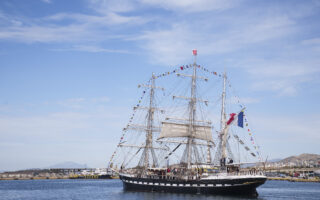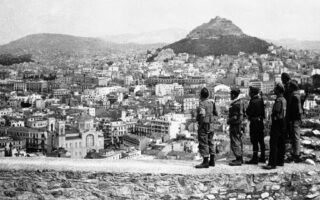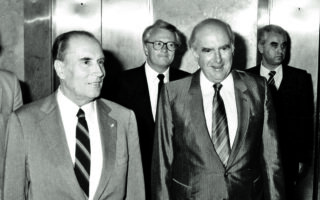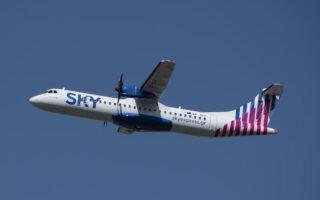A time when Greek industry was roaring
A little-known yet vital chapter of early 20th century innovation, domestic motors are still used on fishing boats, tractors and in irrigation systems

A symbol of different, industrial times, Greek-made engines live among us, often hiding in plain sight. We can hear them powering fishing boats and tractors or watering fields of crops, but you need to get up close and personal to see the manufacturer’s logo, written in the elegant typefaces of yesteryear. Malkotsis, Axelos and Roditis are but some of the many names behind the tale of the Greek engine, a tale of innovation that unfolded across the breadth of Greece, from Thessaloniki and Mytilene, to Halkida and Kalamata. However, some of the most successful chapters of that story were written in the town of Volos, on the island of Syros, and in the port city of Piraeus.
‘Detroit’ in Thessaly
Almost a century ago, in the early 1930s, the coastal town of Volos practically shook with the roar of industry. Such was its output in diesel engines, the media of the time had dubbed it ‘Greece’s Detroit.’ During a census of 1930 of the engineering sector, in fact, authorities recorded 134 businesses with 607 employees, producing a total motive force of 618 horsepower – impressive numbers for a small town that had managed in just 50 years of life to create a thriving industrial community from the ground up.

“Volos did not even have a port at the start of the 19th century,” says Dimitris Dervenis, a local shipbuilding mechanical engineer who has studied the town’s technological history in depth. “There was nothing there except for Mount Pelion, a rich place which conducted its exports from the beaches of Tsagarada and Zagora. To the west was the Thessaly Plain, with its enormous agricultural output, large-scale landowners and agricultural activities. Volos started becoming a commercial center around the mid-19th century, acquiring a middle class of merchants, some of whom branched out into manufacturing. They covered a big gap in the support system for local agriculture and, to a smaller extent, fishing and sailboat shipping. The burgeoning local fishing fleet prompted the engine builders to start building boat motors,” explains the engineer, who remembers the motor in his father’s boat, a “Roditaki,” as the legendary, single-cylinder, diesel-powers motor produced by the Roditis factory was fondly known. “He and many of his friends who fished had this motor on their boats and they loved it – they wouldn’t change it for the world,” adds Dervenis.
Apart from Roditis (founded in 1886), other important local motor manufacturers – we learn from Dervenis’ study on the matter – include Dimadis-Kanakis (1920), Axelos (1929), Vidalis (1933), Souipa-Paschalis (1925) and Lagos-Fapas (1933). Roditis, in particular, employed 64 people and was producing 320 engines a year by 1965. It expanded by joining forces with a German firm but the rapid spread of electricity in agriculture, imports from Eastern Europe negotiated at the bilateral state level and competition from West European manufacturers ate away at sales and forced the business to shut down in 1971.
‘Liverpool’ in the Aegean
Half a century before Volos was even founded, Ermoupoli, the capital of Syros and the Cycladic islands, had already achieved a similar miracle. Shipping, commerce and industry flourished in the port town, earning it too a moniker, as the “Manchester” or “Liverpool” of Greece. Between the two world wars, Ermoupoli came to boast a network of some 68 factories and dozens of smaller manufacturing units, producing, among other things, diesel engines.
Speaking to Achilleas Dimitropoulos, the director of the Industrial Museum of Syros (where you can admire some of the island’s old engines up close), we learn that the two biggest machine shops in the 1923 registry of Ermoupoli’s factories were Neorion and Barbetas Brothers. The latter, established in 1865, was the oldest but came second to Neorion in output, though its potential was more than amply demonstrated when it built two barges in 1938 for what was then the Hellenic Royal Navy.

‘We do not have the love or pride that other nations have for their industrial accomplishments’
Post-WWII, several smaller machine shops operated in the area and were sufficient to cover local demand. These included Freri, which produced patented internal combustion engines, as well as Karavelas, Galanos, Stefanou, Chelidonakis and Maoutsos.
Dimitropoulos ponders a typical scene of daily life in the “industrial” part of Ermoupoli in the 1960s: “Galanos and Freris, neighbors on the coastal road, would display their motors on the sidewalk to attract buyers. This open-air ‘bazaar’ of locally produced engines was indicative of an element of this town that is still vibrant today; it testified to the fact that the people of Syros are, perhaps more than any other professional activity, engineers.”
Bustling Piraeus
Closer to the capital, meanwhile, Piraeus had started taking trade away from Ermoupoli since the end of the 19th century, cashing in on the opening of the Corinth Canal. The capital’s main port, like Athens itself, evolved into a hub of industry, with dozens of larger and smaller motor and engine manufacturers. They included Argyriou (founded in 1887) and Valiadis (1927), though the star was the machine shop of Sokratis Malkotsis, a transplant from Asia Minor, who set up the business in 1934 and went on to specialize in the production of diesel and semi-diesel engines after World War II.
In 1949, the factory employed 150 technicians and produced the first petrol-powered motors that were used in a plethora of activities, though the bestsellers were those built for use at sea. Made to last, you can still see them on some of Greece’s dwindling fleet of traditional wooden boats, which are fast headed to extinction.
Its EM Diesel line comprised engines designed to be used on tractors made by the company, which were unveiled in 1959 but never mass-produced. The company’s finances deteriorated until it was bought out by another firm in 1991.
We could say, in fact, that Malkotsis is a symbol of the rise and fall of the Greek engine: It reached the peak of quality and innovation, as well as scale, but stumbled on real market forces.

In our quest for the causes of the inglorious demise of Greece’s industry, we reached out to chemical engineer Dr Labros Skartsis, who has published a series of invaluable studies on the history of Greek engineering and automation. The first is his 1995 “Encyclopedia of Greek Vehicles and Aircraft,” followed by “Made in Greece” in 2003, co-authored with Giorgos Avramidis. Both are in Greek. In 2013, meanwhile, he published “Greek Vehicle & Machine Manufacturers 1800 to Present: A Pictorial History,” which is in English and provides a broader view of the subject.
“There are all sorts of theories of conspiracies against the nation, that production of engines and other mechanical products was deliberately sabotaged and other such nonsense,” Skartsis tells Kathimerini. “But my opinion is that the evolution of this particular sector was greatly affected by our relationship, as a people, with technology and industry. We do not have the love or pride that other nations have for their industrial accomplishments. A simple example is the reaction to Turkey’s incredible industrial and technological progress. You’d expect the comparison to serve as an incentive, to push us into a similar course of action; instead, we’re indifferent. The stance of the average Greek, which also concerns perceptions of the country’s development (perhaps because of an over-emphasis on ancient Greece), also had multiple effects on decision making and policy. The economic situation, globalization, the small size of the market, the cost of production or that there has never been enough state support and infrastructure are, indeed, factors that led to the sector’s demise, but I believe that our attitude played an even bigger part.”
Is there hope?
“I’m in touch with many creative forces who are trying to produce relatively innovative mechanical products within the framework of a much older series of related communications and my area of expertise. So, I can say that there are creative people who are trying, but they are constantly running into obstacles, most of them stemming from the indifference I mentioned above (which also leads to inflexible bureaucratic procedures). Rarely are people interested in boosting innovation in engineering and technology, and this is, evidently, a perpetual phenomenon in this country.”





